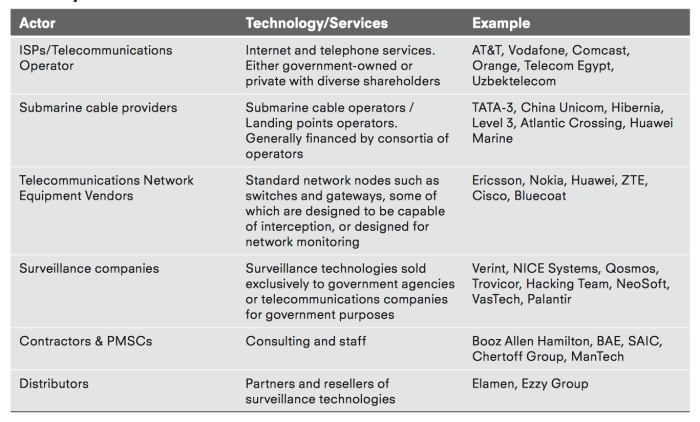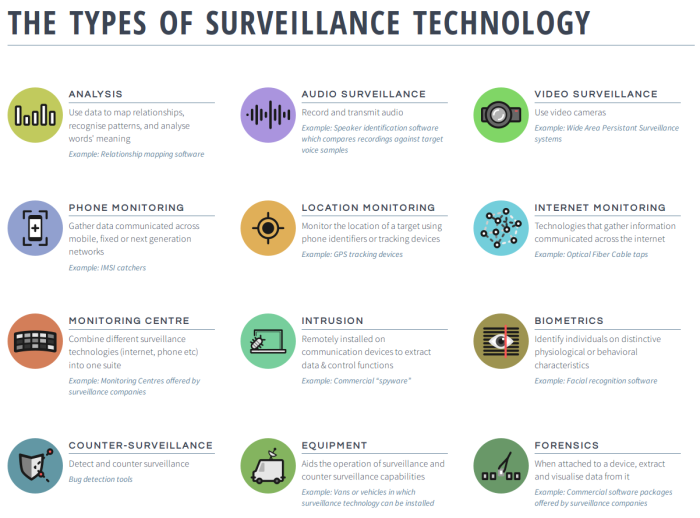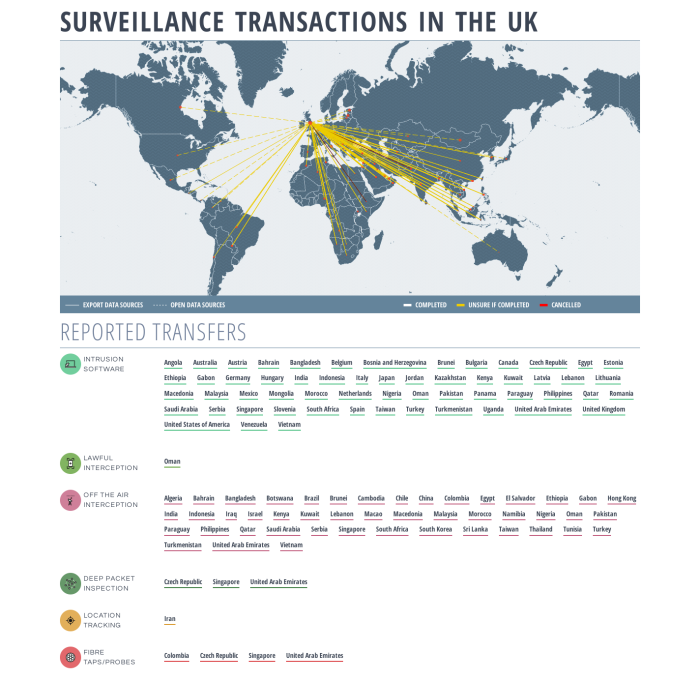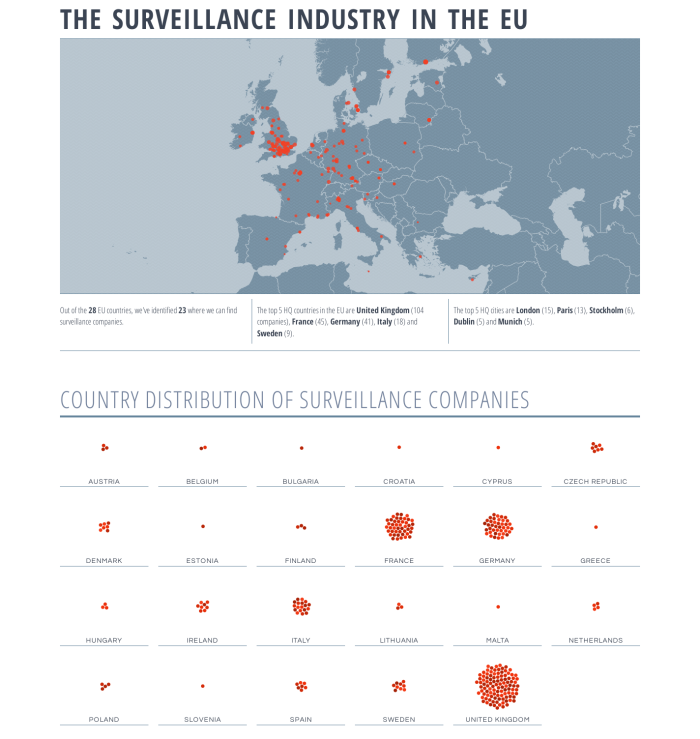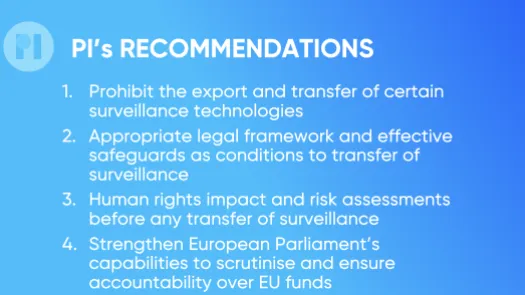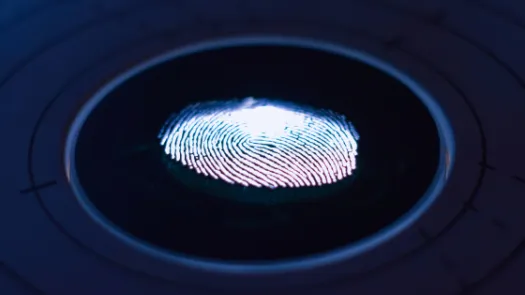The Global Surveillance Industry
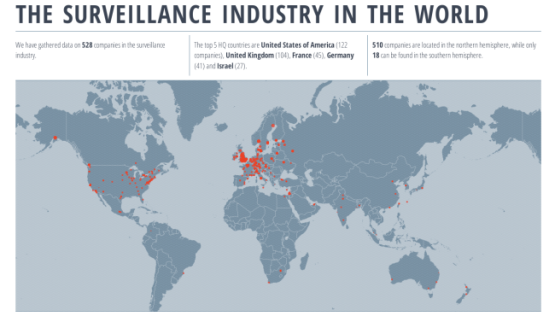
What is the Global Surveillance Industry?
Today, a global industry consisting of hundreds of companies develops and sells surveillance technology to government agencies around the world. Together, these companies sell a wide range of systems used to identify, track, and monitor individuals and their communications for spying and policing purposes. The advanced powers available to the best equipped spy agencies in the world are being traded around the world. It is a lucrative business, but is so secretive and murky that no-one really knows its overall value.
In 1995, Privacy International published Big Brother Incorporated, the first ever study of the increasing role of the arms industry in the international trade in surveillance technology and their role in exporting sophisticated surveillance capabilities from developed countries to non-democratic regimes. Since then, we have continued to monitor the industry, and have compiled our data within the Surveillance Industry Index (SII), the world’s largest publicly accessible database on the commercial surveillance sector, featuring as of May 2016 data on 528 companies. Our report, The Global Surveillance Industry, provides a comprehensive analysis of the industry, including its history, products, and customers.
Who's involved?
The modern electronic communications surveillance industry evolved from the commercialisation of the internet and digital telecommunications networks during the nineties, when governments began passing new laws demanding new electronic surveillance powers and technical protocols to guarantee government access to networks. In response, a global industry developed consisting of arms contractors, telecommunications companies, IT businesses, and specialised surveillance companies, overwhelmingly based in large arms- exporting countries with advanced economies.
A nationwide surveillance architecture is comprised of various types of companies:
- Internet Service Providers (ISPs) and telecommunications operators, which manage networks and charge subscribers for certain services, such as internet, mobile and fixed-line telephony services, and may be required to ensure that their networks are accessible to government agencies.
- Telecommunications equipment vendors are companies which develop the necessary hardware, such as switches and routers, upon which networks run. Because they are developed with Lawful Interception capabilities, when they are exported some equipment by default actively carries out surveillance, or is designed in a way to be easily accessible for surveillance purposes. Some vendors specially develop and market equipment for surveillance purposes.
- Surveillance companies sell technologies for law enforcement and intelligence purposes. These can be systems which facilitate the Lawful Interception process, sold for example to operators for compliance purposes, or sold directly to government agencies providing more widescale, untargeted, and intrusive capabilities.
What do they sell?
When it comes to surveillance technology, you might think of small GPS tracking devices, cameras, and hidden bugs - and you'd be right. But it also consists of a wide range of constantly developing sophisticated systems the very existence of which is kept secret. This includes equipment used to monitor internet communications on a mass nationwide scale, malware deployed through national internet providers which can turn on your computer or mobile's camera, and mobile phone monitoring technology which can trick hundreds of mobiles into connecting to it, used for example to identify everyone at a protest.
Who do they sell it to?
The industry and its customers stubbornly refuse to disclose any details about sales. Information that we have only comes from investigative reporting by journalists and NGOs and some export data published by a handful of governments. From what we know, government agencies ranging from customs and tax enforcement to foreign intelligence are buying their surveillance equipment from the market, in countries with the most advanced agencies to some of the most authoritarian countries in the world.
Why is this an issue?
The spread of the internet and new communications methods has increased the intrusiveness of surveillance as well as its power. It’s now technically possible to monitor entire groups and nations on a mass scale, systematically and relatively cheaply. This poses a fundamental threat to individuals security, civil society, human rights, as well as democracy itself.
Even in political systems with significant checks and balances, surveillance capabilities have regularly outstripped the ability of laws to effectively regulate them. In non-democratic and authoritarian countries, surveillance technology can be used for human rights abuses and undermine democratic development and privacy, a human right essential in allowing individuals control, dignity, and the realisation of other human rights such as freedom of expression. The global surveillance industry has sold such systems to some of the world's worst human rights abusers, where they have been targeted at human rights activists, journalists, opposition members, and the judiciary. Activists have had their communications read to them during torture.
What can be done?
The industry continues to operate without accountability because it refuses transparency. Surveillance companies market their products to government agencies behind closed doors at arms fairs closed to the public, and refuse to reveal any information about their customers.
Privacy International together with journalists and researchers around the world investigate and expose this secret world, providing information on which companies are involved, what they are selling, who they are selling them to, and how their technology is being used. We advocate for strong safeguards in international export control laws which can stop exports if there is a risk of human rights abuses and force governments to provide more transparency. We promote strong international and national laws which to provide sufficient safeguards against abuses and that surveillance is only conducted in line with international human rights law and with strong oversight. But most importantly we work with an international network of experts and advocates to build a global movement capable of holding government surveillance powers and the industry which facilitates them to account.
